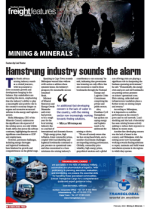Having reached the limit of its borrowing power, Transnet lacks the capacity to expand infrastructure and increase its ability to transport more minerals from mines to ports. With plans to allow third-party use of railway lines nationwide, the challenge requires urgent resolution, according to Transnet's chief strategy and planning officer, Andrew Shaw. He acknowledges the poor condition of the network, emphasising the substantial investments necessary for upgrades before third parties can take over.Addressing delegates at the annual Investing in African Mining Indaba in Cape Town, Shaw highlighted the importance of accessing funding swiftly to maximise effectiveness in the next five to 10 years. South Africa's constrained logistics network stands out as one of the primary challenges facing the local mining sector, significantly inf lating costs as reliance on road freight increases due to rail network limitations. Ongoing congestion and equipment challenges at ports further impede exports.According to Shaw, South Africa is on the cusp of a significant transition in the railway sector, with third-party access to the rail network set to be introduced by April this year following public consultation.“There is considerable opportunity for enhancing rail’s ability to move minerals and manufactured products. The idea is for third-party access to the network so that additional operators can operate and compete with the state-owned operator and provide services to a multitude of customers,” he said.According to Shaw, there is significant opportunity in the mining sector for railway operators, noting that while freight rail currently transports around 150 million tonnes, there are approximately 225 million tonnes of available volume – a considerable surplus compared to current transportation levels.Referring to the Roadmap for the Freight Logistics System, Shaw outlined its potential to revolutionise logistics in the country by enabling the doubling of freight transported by rail. However, achieving this would necessitate substantial investments in the country's rail infrastructure.He mentioned the need for Transnet to reform Transnet Freight Rail, exploring various options such as Public Private Partnerships and joint ventures. Regardless of the chosen approach, it would signify significant changes for the railway sector in the country. Shaw highlighted Transnet's existing joint operation with Maputo’s CFM and the upcoming introduction of third-party access from April this year, enabling operators to directly utilise their network. Ultimately, he said, the focus was on enhancing rail capabilities significantly to efficiently transport more products for export.

